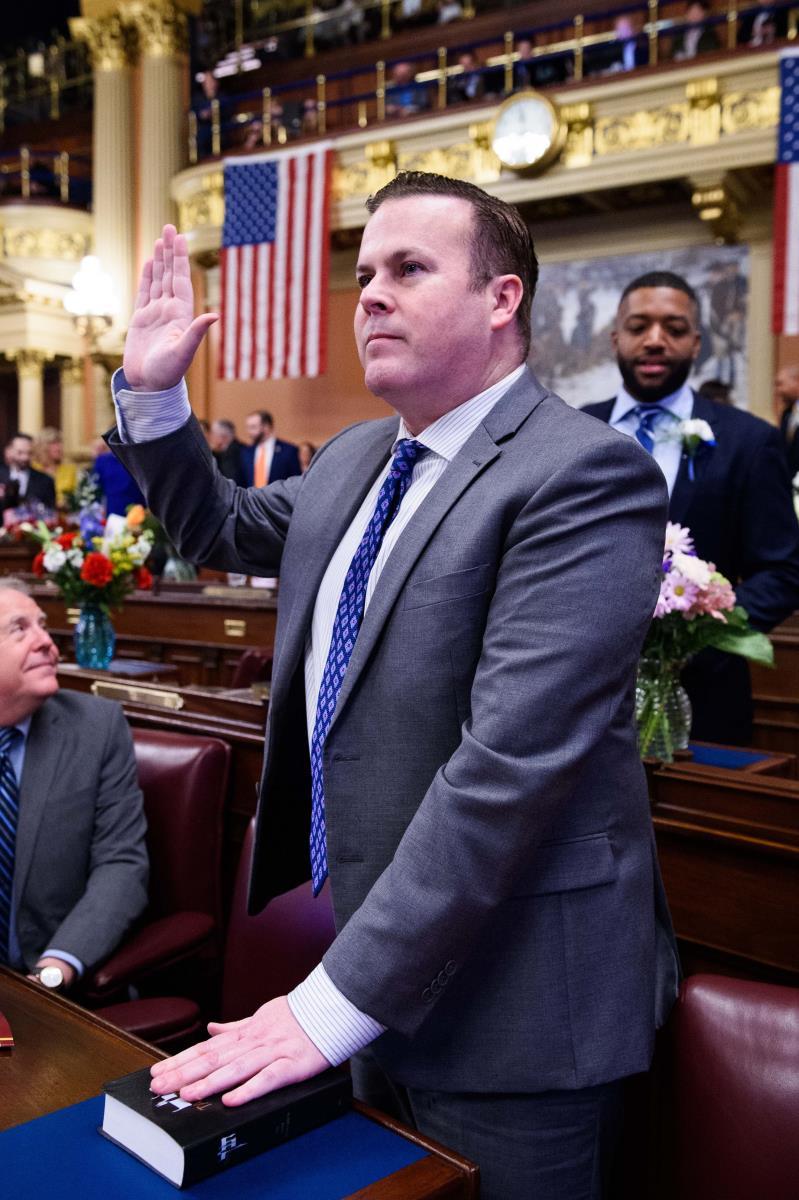
A pedestrian passes newly installed posters on a shuttered businesses in Philadelphia, Monday, May 4, 2020. (AP Photo/Matt Rourke)
Many Republican state lawmakers, however, have not always agreed with the governor’s handling of the coronavirus outbreak.
Unlike a number of other states currently documenting an uptick in COVID-19 cases—including Arizona, Florida, Nevada, Oregon, and Texas—Pennsylvania has managed to flatten the curve. The Commonwealth is one of three states to document a downward trajectory of cases for more than 42 days.
“We know our decline in cases is because of our choices because more than half of states are experiencing an increase in COVID-19 cases as reopening begins,” Gov. Tom Wolf said in a statement. “Many of these states are experiencing significant case increases tied to reopening too soon or too much. Pennsylvania is not. We have remained focused on balancing economic interests with public health.”
Many Republican state lawmakers, however, have not always agreed with the governor’s handling of the coronavirus outbreak. In fact, many have urged officials to change the health metrics they use to measure coronavirus caseload to help their districts reopen more quickly.
Last month, the Republican-controlled General Assembly approved Senate Bill 327, which gave counties the authority to create their own plans for businesses to reopen and urged officials to change health metrics that would allow counties to open up sooner.
State Rep. Chris Quinn (R-168) was one of the lawmakers who voted in favor of the bill. In a statement, he acknowledged the number of Pennsylvanians who had lost their lives to COVID-19 but noted that the majority of cases can be traced to nursing homes.
“The death toll experienced here in Delaware County has been truly tragic” Quinn said. “We also know the vast majority of deaths have been in our senior homes, and we need to continue to protect the most vulnerable among us and allow others to continue to earn a living.”
Quinn said that he supports county officials in his district who have urged the governor to separate coronavirus counts that come from senior homes from the rest of cases to “allow us to reopen our economy more quickly.”
Quinn’s district, which covers most of Delaware County, has seen a total of 6,741 coronavirus cases and 629 deaths.
Separating COVID-19 cases like this to reopen parts of the state could pose problems for slowing the spread of the virus. It’s important for health officials to monitor community spread, according to the CDC. Choosing which metrics to look at when deciding whether or not to reopen a state, instead of looking at all available metrics, wouldn’t provide a full picture of the risks.
A new report released this week from the Centers for Disease Control and Prevention confirms that older people are at the highest risk of death, but so are minorities and those with pre-existing health conditions.
“Hospitalizations were six times higher and deaths 12 times higher among those with reported underlying conditions compared with those with none reported,” the report states. This, the CDC points out, shows the importance of “the continued need for community mitigation strategies.”
“The COVID-19 pandemic continues to be severe,” the report’s authors write, “particularly in certain population groups.”
State Rep. Meghan Schroeder also joined colleagues last month to submit a letter in support of the Bucks County Commissioners, who urged Gov. Wolf and the state department of health to consider cases traced to nursing homes separately when weighing the decision to reopen.
“In our County, we are seeing a high percentage of deaths, and even hospitalizations, that are attributable to COVID-19 are also associated with occupants of long-term care facilities. In fact, yesterday, April 29, was our deadliest day so far with sadly 20 deaths. All 20 deaths were among residents of long-term facilities,” they wrote at the time. “Recently, Dr. [David] Damsker has repeatedly reported very little community spread in Bucks County. It is for this reason we respectfully request a change in the metric being used to calculate the transition between the phases of recovery.”
In early June, however, Bucks County reported 11 new coronavirus cases tied to a single person who attended house parties on the Jersey Shore two weeks earlier. In total, Bucks County has seen a total of 4,959 coronavirus cases and 546 deaths.
GOP officials in other counties, including Lancaster, Dauphin, Franklin, Lebanon and Schuylkill, tried in May to move forward with plans to lift coronavirus restrictions without the governor’s blessing, but were quickly called out by Gov. Wolf for being rebellious and “choosing to desert in the face of the enemy.”
“The politicians who are encouraging the people they were elected to lead to quit the fight are acting in a most cowardly way,” Wolf said.
State Rep. Sue Helm, who represents parts of Dauphin and Lebanon Counties, said she “was angered and disappointed by the governor’s comments.” She also voted in favor of Senate Bill 327 to change the way data collected from nursing homes is analyzed and allow counties to reopen when they see fit.
Gov. Wolf ultimately vetoed that bill, saying “this bill authorizes a disjointed patchwork approach under which each county would make critical decisions that have Commonwealth-wide effects. Rather than fracturing into counties, we must continue to work together, as Pennsylvanians, to keep each other safe.”
Politics

Influencers and creators find new ways to engage young Philadelphia voters
Rec Philly, a space for creators and influencers, teamed up with Show Up Strong to get hundreds of young Philadelphia residents engaged in the...

New Biden rule protects privacy of women seeking abortions
Under the new rules, state officials and law enforcement cannot obtain medical records related to lawful reproductive health care with the goal of...

Biden marks Earth Day by announcing $7 billion in solar grants
The Biden administration on Monday announced the recipients of its Solar For All Program, a $7 billion climate program that aims to lower energy...
Local News

Conjoined twins from Berks County die at age 62
Conjoined twins Lori and George Schappell, who pursued separate careers, interests and relationships during lives that defied medical expectations,...

Railroad agrees to $600 million settlement for fiery Ohio derailment, residents fear it’s not enough
Norfolk Southern has agreed to pay $600 million in a class-action lawsuit settlement for a fiery train derailment in February 2023 in eastern Ohio,...



